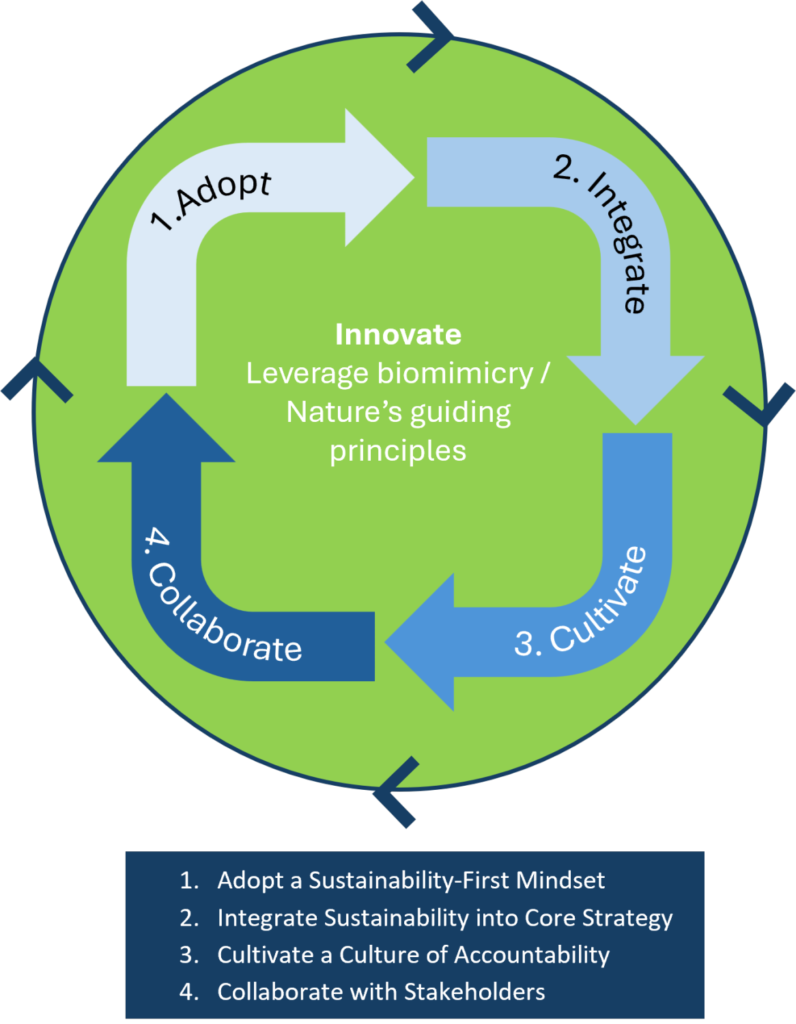Holistic Impact
Holistic impact refers to the comprehensive and interconnected benefits a business can realise by embedding sustainability into its core operations and strategy. It considers the full spectrum of a company’s ecosystem: its processes, people, profits, and the planet.
Sustainability that drives holistic impact touches every part of the organisation and creates value at multiple levels, including:
- Environmental Sustainability: Reducing the organisation’s ecological footprint and resource consumption.
- Social Sustainability: Ensuring the well-being of employees, communities, and stakeholders.
- Economic Sustainability: Enhancing long-term profitability and financial stability.
- Cultural Sustainability: Aligning corporate values and behaviours with long-term responsible business practices.
Beneficial Components of Holistic Impact
To understand how businesses can achieve this holistic impact, we must break down its core components. These elements work together to create a sustainable ecosystem within the organisation, amplifying benefits across all areas of operation:
Environmental Responsibility
It’s about fundamentally rethinking how a business interacts with the environment. Inspired by biomimicry and its guiding principles businesses can design their operations to mirror nature’s systems, which are inherently resource-efficient and waste-minimising. Strategies include adopting circular economy principles, investing in renewable energy, and reducing waste to create a regenerative business model that benefits both the environment and the bottom line.
Social Equity, Enhanced Reputation & Brand Loyalty
This includes fostering equitable practices within the organisation, ensuring fair wages, diversity, and inclusivity, and promoting the well-being of employees and communities. Companies that integrate social sustainability into their operations see higher employee satisfaction and engagement. Moreover, by positively impacting the communities they operate in, businesses strengthen their social license to operate, building trust and loyalty among their customers, investors and other stakeholders.
Cultural & Employee Well-being
Leaders need to champion sustainability as a guiding principle, modelling behaviours that align with long-term, responsible business practices. By embedding sustainability into the organisation’s values, culture, and decision-making processes, businesses create an environment where innovation and accountability flourish. Employees feel empowered to contribute to sustainable solutions, leading to higher retention and greater productivity.
Economic Resilience & Innovation
Economic sustainability ensures that the pursuit of social and environmental goals is not done at the expense of profitability. A business that embraces sustainability as an opportunity positions itself for long-term economic resilience. Companies with a sustainability focus often gain access to new markets, appeal to investors seeking responsible investments, and are better equipped to adapt to economic shifts and future regulations.
Systems Thinking & Integration
Biomimicry teaches us that natural systems are interdependent and self-sustaining. Likewise, businesses must adopt systems thinking, recognizing that all parts of the organisation are interconnected. Sustainability initiatives should not be confined to a single department but integrated across the entire operation. Systems thinking helps organisations identify and capitalise on synergies, reducing inefficiencies and creating shared value across the business.
How to Achieve Holistic Impact
To achieve holistic impact requires a deliberate and strategic approach, grounded in mindset transformation and supported by practical action steps. The figure below shows how organisations can move from theory to practice. They are presented as process steps forming a circle – a circle of perpetual transformation. The green circle represents the basis and supportive process for the other process steps using nature’s principles/biomimicry to improve sustainability through innovation at the different ‘levels’ – design (function), processes and/or the eco-system of your business. Biomimicry provides a wealth of inspiration for designing sustainable business models that mimic nature’s efficiency, adaptability, and resilience. By studying how natural systems work, companies can innovate new processes, products, and services that are inherently sustainable. Furthermore, we can apply these principles inside the organisation considering all internal and external stakeholders. We can innovate our behaviour and the way we organise and structure our internal organisation as a whole.

figure: process steps to achieve holistic impact (NEO Training & Advisory)
Conclusion: Sustainability as a Strategic Opportunity
Holistic impact is about transforming the way a business operates, competes, and creates value. By embracing sustainability as an opportunity, businesses can unlock resilience, innovation, and profitability that goes beyond regulatory compliance. Achieving holistic impact requires a mindset shift, systems thinking, and a commitment to embedding sustainability into the fabric of the organisation. When done right, it offers far-reaching benefits that position a company for long-term success in a rapidly changing world.
At NEO Training & Advisory, we specialise in guiding businesses through this transformative journey, leveraging biomimicry and sustainability to help organisations achieve their full potential. When you’re ready to make sustainability a core part of your strategy and unlock holistic impact, let’s begin the conversation.
Floris Robert Slob

